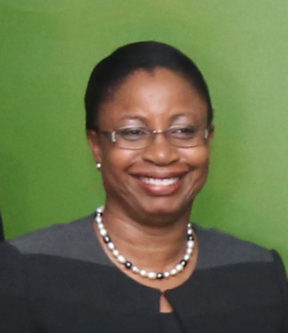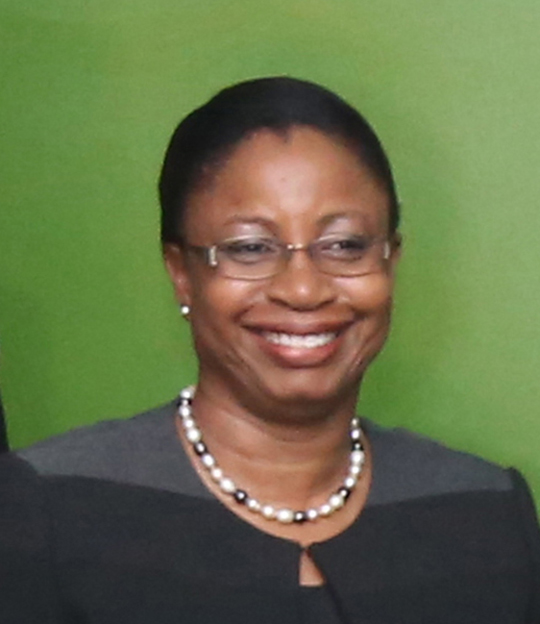President David Granger has discretion to reject an entire list of nominees for the post of Chairman of the Guyana Elections Commission (Gecom) as being unacceptable, but it is not “absolute,” according to Chief Justice Roxane George SC, who has also found that he is required to give reasons for his decision and his failure to do so already could be subject to judicial review.
“The submission of the list does not mean that the President is obliged to accept the list or the persons named in it. If the President is of the view that the list is deficient either in totality or in the names that have been included, he can exercise his discretion to deem the entire list unacceptable. He must, however, give reasons for so doing so that it is known why there was a rejection so that he could properly move to apply the proviso to article 161(2) which allows the appointment of persons from the judicial category only. While the President is immune from suit, his decisions and actions are not. Thus, whether in the exercise of his discretion there has been compliance with the Constitution is justiciable,” Justice George states in her written ruling on the interpretation of Article 161(2) of the Constitution, which was released on Monday, just over three months after the oral ruling was handed down.
She notes that a “commonsense approach” would be to choose whomever is acceptable but adds that the President can nevertheless exercise his discretion to reject the entire list as being unacceptable.

“It would be up to the President to determine whether he would choose a person who is eminently qualified even though no other person on the list is acceptable or whether he would reject the entire list. In making this determination, the President would perforce have to consider whether each person named is acceptable or not. Simply, where the President has determined that some persons on the list are unacceptable he is not obliged to select anyone else from the six names for appointment. Thus, if the President considers that one or more persons on the list is not a fit and proper person and therefore unacceptable, then he may decide to reject the entire list as being incomplete or restrictive, or he may decide to choose one of the persons if they qualify even though every person named in the list is not acceptable. Therefore the whole list need not be rejected,” she further states.
A decision by President Granger is being awaited on the latest list of six nominees, which was submitted by Opposition Leader Bharrat Jagdeo on August 25. Jagdeo’s two previous lists of nominees have been rejected by the president.
The latest nominees are Joe Singh, a retired Guyana Defence Force Major General, who previously held the post and is seen as the frontrunner for the appointment; former long-serving magistrate Krisndat Persaud; attorneys Teni Housty and Sanjeev Datadin; pilot and biodiversity advocate Annette Arjoon-Martins; and Adventist pastor and agriculturalist Onesi La Fleur.
It was the rejection of the first list that had prompted businessman Marcel Gaskin to move to the court for an interpretation of Article 161(2), which provides for the appointment.
[gview file=”https://www.stabroeknews.com/images/2017/09/gaskinvag2.pdf”]
[gview file=”https://www.stabroeknews.com/images/2017/09/gaskinvag3.pdf”]
Article 161(2) states, “Subject to the provisions of paragraph (4), the Chairman of the Elections Commission shall be a person who holds or who has held office as a judge of a court having unlimited jurisdiction in civil and criminal matters in some part of the Commonwealth or a court having jurisdiction in appeals from any such court or who is qualified to be appointed as any such judge, or any other fit and proper person, to be appointed by the President from a list of six persons, not unacceptable to the President, submitted by the Leader of the Opposition after meaningful consultation with the non-governmental political parties represented in the National Assembly.”
Due to the rejection of the first list and President Granger’s stated preference for a judge or a person qualified to be a judge to take up the post, Gaskin had sought a declaratory order on whether the nominees needed to include a judge, former judge or a person qualified to be a judge; whether the president had to give reasons for rejecting each nominee as unacceptable; whether he is obliged to select a person from the list of six, that is, unless he has found the nominees unacceptable as fit and proper for appointment; and whether the president finding one or more nominee as being not fit and proper would render the entire list unacceptable.
As was previously reported, Justice George found that the list of nominees does not have to include a judge, a former judge or a person qualified to be a judge, while rejecting arguments by Attorney General Basil Williams that the constitution gave preference to nominees who fell into this “judicial category.”
“There is no mandatory category. There is no order of preference in the categories of persons listed in relation to nominees for the post of Chairman of Gecom. Persons from each category are each equally entitled to be appointed,” she states. “If there are any persons named on the list as falling into the judicial category and the President chooses to consider them in priority to the other persons named but who do not so fall, then that is in his discretion so to do. But the Leader of the Opposition cannot be fettered into naming persons who are, or have been, or are qualified to be a judge in the list of persons,” she states in the written ruling.
Jagdeo’s second list had included two former judges and three attorneys.
Discretion
Justice George, however, adds that eligibility of the nominees did not automatically mean suitability for appointment. She said while a nominee may be deemed fit and proper, that person could still be considered to be unacceptable for some valid reason, such as poor health, national security concerns, or political bias.
At the same time, she acknowledges that it would be “restrictive” to maintain that all the persons on a list must be acceptable before a choice can be made. “If in the entire list there is one person who is eminently qualified and therefore is fit and proper and acceptable, then one would expect that that person would be chosen. The choosing of one of the listed persons would mean that the others have not been considered suitable for the post for whatever reason. Otherwise the list would always have to be rejected in its entirety with the consequence that the acceptable person could not be appointed. Thus, it is not mandatory that the entire list of names be acceptable. One or some may be either acceptable or unacceptable. If only one is acceptable then the President may choose such person; moreso because at the end of the day only one person can be appointed so automatically that person would be deemed to be acceptable for appointment,” she notes before also pointing out that the President could also exercise his discretion.
The judge notes that the Attorney-General indicated that the president’s discretion is unfettered and cannot be questioned on this point, and she also observes that there is no requirement under the Constitution for the President to state reasons for deeming each of the six names on the list or the entire list unacceptable. “Nevertheless, the modern thinking is that reasons for decisions and actions should be given. The giving of adequate reasons is in effect the essence of democracy and good governance,” she says, before arguing that the Opposition Leader is “entitled” to know the reason for the rejection or any of the nominees or the entire list.
“The fact that pursuant to article 111 (I) the President shall act in his own deliberate judgment does not mean that he should not provide reasons for arriving at his decision to reject the list because in the context of article 161(2) where the Leader of the Opposition is constitutionally mandated to submit and has submitted lists of names for consideration one would expect that the President would have a reason or reasons why in his deliberate judgment the list was rejected,” she says. “Given that article 161(2) requires the involvement of the Leader of the Opposition, the exercise of the President’s discretion is not and cannot be considered to be absolute or singular. The Leader of the Opposition, and others for that matter, may not agree with the reasons given, but they must be given so that the parameters for the submission of another list, if required, would be set. Such reason or reasons should be communicated to the Leader of the Opposition moreso as clearly a decision was taken that a second list be submitted. It is now common knowledge that a second list was also rejected. By being given reasons, the Leader of the Opposition would be given an indication of who, in the sense of the qualities in persons, would be acceptable. Further and importantly, the exercise of his judgment to reject the list and giving reasons therefore could support the resort to the proviso to article 161 (2) which permits the President to act independently to appoint a person of the judicial category to be the Chairman of GECOM, that is a person who is presumptively fit and proper,” she adds.
On the latter part of the ruling, Gaskin has said that the Chief Justice “went beyond what was asked by me of the court in addressing the proviso to Article 161 (2), which only applied if the Leader of the Opposition failed to submit a list.”
The proviso states, “Provided that if the Leader of the Opposition fails to submit a list as provided for, the President shall appoint a person who holds or has held office as a judge of a court having unlimited jurisdiction in civil and criminal matters in some part of the Commonwealth or a court having jurisdiction in appeals from any such court or who is qualified to be appointed as any such judge.”
Jagdeo, based on the reports on the ruling in July, had also voiced concern over the judge’s pronouncement on the proviso, which he too maintained only applies when no list has been submitted.
“More significantly, the proviso to Article 162 of the Constitution was not placed before the Court for its interpretation, nor was it part of any of the questions posed to the Court, nor was it the subject of any legal submissions, either from the Applicant’s, nor the Guyana Bar Association’s nor my Attorneys-at-Law. It is therefore rather strange that such a proposition appears to form part of the ruling in the case,” he had said in a statement, before saying he would await the written decision to guide how he would proceed on the point, including supporting an appeal by Gaskin.










